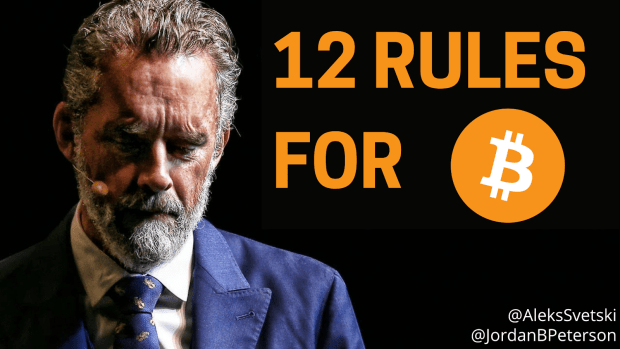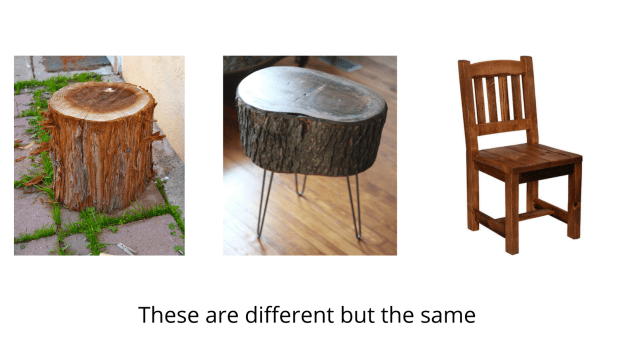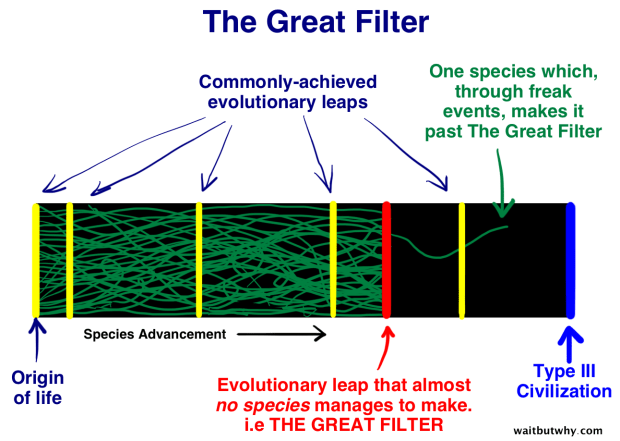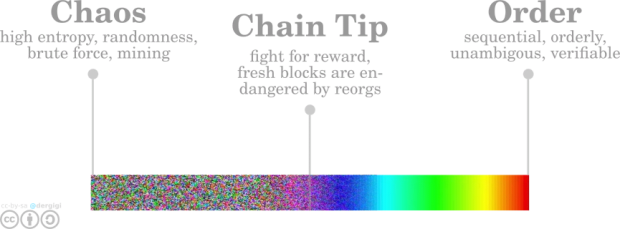- May 27, 2021
- Posted by: admin
- Category: BitCoin, Blockchain, Cryptocurrency, Investments
Bitcoin will destroy tyrannical order and replace it, not with blind chaos and confusion, but with an incorruptible foundation.
12 Rules For Life Series, Essay Two

The series continues. If you’ve not yet read part one of the series, you can find it here.
Foreword
The second chapter in Jordan Peterson “12 Rules For Life” is entitled, “Treat yourself like someone who you are responsible for helping.”
It’s a fascinating chapter which delves into the essence of the human condition, the roots of guilt, sacrifice, shame, courage, conscious action and a brilliant discussion on what some might term the essence of existence, i.e.; chaos and order.
You might wonder, “what the hell does Bitcoin have to do with this?” or “How in the hell are you going to relate Bitcoin to these ideas?” I would agree with you that this is a challenge, had the chapter been some uni-dimensional discussion about why you should be nice to yourself (although perhaps the nicest thing you can do for your future self is to preserve the product of your labor, or in other words, buy bitcoin).
But as usual, JBP draws upon a very broad set of ideas and concepts for which, similar to essay one, I shall do my best to convey what I believe are some profound lessons and analogies in relation to Bitcoin and its impact on individuals and the world.
The Power Of Narrative
Jordan opens the chapter with some questions:
Why is it that people don’t take care of themselves?
From where does this guilt, shame or self-loathing stem?
He proceeds to then make an important point. One that we both innately understand and that permeates all corners of the earth.
Human beings are social creatures and we interpret the world around us in the form of stories or narratives.
Long before we adopted the scientific method, and to this day, how we view the world is not through the purely objective lens of “that which it is,” but via the more subjective lens of “what does it do/what does it mean?”
The best way to think about this is the following diagram:

Our minds perceive the stump and the chair as the same category.
It’s a “sitting thing.” Yes, we can later rationalize the material differences between the objects but our instinct is to view and perceive the object in terms of what it means and therefore how we may use it.
This distinction is at the core of all human behavior and is evident all throughout history. From “The Iliad” to the Talmud, “The Vedas” to the Bible, through to priests and shamans or rumi, Shakespeare, Jung, Joseph Campbell, Rand, Disney, Marvel, Heinlein and Hollywood.
Stories, archetypes, mythology, movies. They all exist to help us understand what matters, and enable us to find meaning in our actions. This is perhaps the most critically human trait of all, and is unfortunately something that’s lost on empiricists, nihilists and utopian utilitarians.
So what does this have to do with Bitcoin?
Let’s find out.
Matter And “What Matters”
As someone whose strongest academic suits in school were physics, chemistry and engineering, I have a deep appreciation for the scientific method and the scientific revolution. The capacity to view, interpret, understand and then manipulate matter objectively is at the heart of technological progress in all civilizations.
With that in mind, I would also posit that while the “scientific method” was not very broadly understood or documented until the Renaissance, the process has existed since man first threw a rock or a stick at his prey. We’ve always performed actions in the pursuit of what matters, followed by some form of analysis into the material nature of the action such that we can improve it.
In other words, human action reinforces the pursuit of what matters.
The only thing that’s really changed is the pace of progress in the study of matter. It’s become exponential because it compounds. The better we get at it, the more technologically advanced we become, and so forth.
And there is a drawback to this.
We have become so focused on the empirical, that we’ve forgotten the meaningful. We’ve deconstructed everything from economics, to art, to philosophy and to psychology in some maniacal attempt to transform it into bits of meaningless data (e.g., Derrida and the rest of the deconstructionists) from which nonsensical “models of the world” are then built and imposed on society.
But the joke is on us. To rephrase another villain (Trotsky’s “You might not be interested in war but it is interested in you”).
While we may have forgotten meaning, meaning has not forgotten us.
In attempting to nullify and denigrate that critical component of existence, we’ve seen everything from the rise of nihilism, to dictatorial regimes and most recently the “religionization” of science.

The sheer force of narrative and how it can deform and derange the world or the populace in the absence of deeper meaning can be seen in modernity’s attempt to treat science as a religion.
The realm of questioning has become a quasi-religion no longer able to be questioned, thus transforming into something that is no longer science.
This is the Streisand effect in action.
Try and suppress meaning, depth and the study of what matters, and it rears its head up in strange, deformed and deranged ways.
2020 and 2021 have been years of peak stupidity in many ways, but this modern “scientism” is one of the shining examples, where:
- Questioning “the science” has become a sin
- Alternative viewpoints have become heresy
- Critical thinking and individual decision making are for heathens and infidels

This form of madness is now everywhere.
It exhibits all of the downsides of blind dogma, while simultaneously being empty of substance in an attempt to be empirical and objectively superior.

It’s all deeply pathetic…
But it wasn’t always like this.
Renaissance 1.0, What Matters Meets Matter
The Renaissance was a period in which the study of what matters met the emerging study of matter.
It was a time of incredible transformation, thinking, creativity and discovery. Prior to that, the world was largely plagued by dogma and an inability to effectively rise up out of poverty. It’s as if one without the other is a bad recipe?
We’ve come a long way since the time of the Galileos and the Medicis. We went from burning them at the stake, to watching them transform the world in the industrial revolution and once again in the technological revolution.
This has brought incredible prosperity with it, but over time, and most recently, we seem to have curtailed the study of what matters, and got lost in pure, desolate matter.
Perhaps this is because “matter” is empirical and thus its study is more objective. Such knowledge compounds so you can better measure results and progress, while the study of “what matters” is more timeless, less changing, more subjective and principled. There was clearly an edge in adjusting your focus during this transformation.
Whatever it may be, that shift in focus has become a decoupling, and has resulted in some strange ramifications across many levels of society.
The study of pure matter does not really care for examining complex tradeoffs, wants, desires and individuals, because they’re far less measurable and not so empirical.
Modernity has applied empirical approaches to things like economics (i.e., Modern Monetary Theory/Keynesianism) in an attempt to distill all human action into some set of equations.
It has then made a series of ridiculous assumptions so that these equations can “seem to work” by representing some isolated subset of reality, ignoring the fact that there is real world cost associated with what was discarded. (Inflation is a great example.)
Furthermore, because it fits some fantasy empirical model, some have chosen to believe they can use it as a justification for mandates and dictates because “nothing really matters, it’s only just numbers.”
This is dangerous on so many levels.
But Bitcoin fixes this.
Bitcoin reminds us why natural economics (aka, Austrian economics), philosophy, ssychology, morality, ethics and history are so important. They help us understand that tradeoffs exist, and guide us away from the runaway destruction that can occur in the pursuit of utilitarian ends.
The Renaissance 2.0: Matter Meets What Matters
Bitcoin is truly the second Renaissance.
By tying the physical to the metaphysical, Bitcoin reunites matter to what matters. As such, it has the capacity to heal the world in the most deep and meaningful of ways.
The “Bitcoin Fixes This” meme may sound trite, but it’s extraordinarily nuanced and accurate. The first, second, third and subsequent order effects of de-monopolizing the resource via which human action is measured, stored and exchanged, and then anchoring it to the second law of thermodynamics, are profound. With it, we have an unprecedented opportunity to rebuild society on a sound foundation. It’s the closest we can get to true equality of opportunity.
I also believe it’s our only path through “The Great Filter.”

Bitcoin is that “freak event” that changes everything.
An incorruptible, fixed supply money enables humans to effectively measure, manage and transact the product of their labor. It allows value to be created, transformed and transmitted with minimal distortion, and trends toward the elimination of waste and falsehoods.
One cannot celebrate fake facts in the face of an economic reality tied to the physical laws of thermodynamics.
Bitcoin permits maximum fidelity human action to permeate society, and as a result, some important things occur:
- The good/useful/functional can compound and proliferate
- The bad/useless/broken can correct or disappear
- Tradeoffs are not only more evident, but inescapable
- Risk can no longer be hidden and subsequent losses socialized. Skin is now in the game, for everyone.
This framework unifies matter and what matters because the lies necessary to separate the two can no longer exist.
The study of what matters, the pursuit of truth, of principles and of meaning can once again be anchored to reality, and vice versa; the study and evolution of matter can operate within the framework and toward ends that matter.
This will have profound implications for humanity and marks what may be the most important fork in the road since homosapiens separated from other hominids.
Chaos And Order
Let’s shift gears now and explore chaos and order.
JBP reminds us that the world of experience (what matters) can also be reduced to its primal constituents:
- Chaos
- Order
- Consciousness
In fact, the idea of consciousness as the point at which chaos meets order is so profound that it may be where not only the meaning of life emerges, but the very thing we actually call life.
Anything too far on one side or the other no longer represents that which is alive — a topic I look forward to exploring deeper in future work.
For now, let’s reference JBP again:
“Chaos is also the formless potential from which the God of Genesis 1 called forth order using language at the beginning of time. It’s the same potential from which we, made in that Image, call forth the novel and ever-changing moments of our lives.
Chaos is freedom, dreadful freedom, too.
Order, by contrast, is explored territory. That’s the hundreds-of-millions- of-years-old hierarchy of place, position and authority. That’s the structure of society. It’s the structure provided by biology, too — particularly insofar as you are adapted, as you are, to the structure of society.
But order is sometimes tyranny and stultification, as well, when the demand for certainty and uniformity and purity becomes too one-sided.”
-Peterson, “12 Rules For Life”
There are so many threads to pull on here in relation to Bitcoin, one could write an entire book about it. I’ll try to pull on a few and link to work done by some brilliant minds, including one of my favorites, Gigi.
Bitcoin Enables Living Order To Emerge From Chaos
The very nature of Bitcoin’s time chain is something that’s designed to take the sum total of all human action, measured in the chaos of all transactions in every market across the entire globe, and transform it into a set of blocks in chronological order via the probabilistically-sound process of using work to achieve consensus amongst a network of participants who do not know each other.
This is the most incredibly complex, but powerfully elegant innovation in human history.
With Bitcoin, the chaos that is the free market can discover relevant order. Information can flow between all network participants in a manner that is uninhibited and not subject to power loss.
Bitcoin is an information and energy superconductor.
This is the fundamental function of money.
A transmission medium for information, value and action.
Without it, no order can be achieved.
This is why sound money is so fundamentally important.
Bitcoin Embodies Chaos And Order
Bitcoin not only enables the emergence of functional, organic order from chaos, but it embodies the same process in the way it functions.
“In a sense, the Bitcoin organism ‘grows’ on the edge between order and chaos: finding new blocks is a chaotic process, and its result is a very orderly list of transactions: the Bitcoin blockchain, also known as the ledger.”
– Der Gigi
Bitcoin takes random, unstructured, chaotic information from the market and using incentives, proof of work and cryptography, transforms it into an ordered global ledger that anyone, anywhere can validate and verify.

Just like all life forms, Bitcoin is an anti-entropic force that has a direction but emerges at the nexus of chaos and order.
I would strongly recommend a read of Gigi’s article entitled “Bitcoin’s Eternal Struggle,” where he dives into this deeper.
With Bitcoin, Chaos And Order Can Dance
For life to exist, chaos must dance with order. Too much of one or the other, and life will cease to exist.
Order has to emerge from chaos, and in the process create a new form of higher order chaos that we can contend with. This dance is in my opinion, the basis of all existence.
We can understand it as follows:
- Chaos must initially exist for order to emerge. This is the essence of creation and “opportunity.”
- One person’s order is another person’s chaos. This subjective nature of chaos and order, especially at the individual level is important.
- Magnification matters. At one level, the system looks chaotic, but on a higher level, order is clearly manifest. This is perhaps a more Taoist viewpoint, but also aligns well with the fractal nature of life.
On a fiat standard, chaos and order continually clash. This is because fiat order is artificial and top down instead of being emergent.
Instead of the forced order creating further opportunity, it suffocates mobility and experimentation. This generates lower quality problems which are then used to justify further arbitrary “fiat order” to deal with it. It’s like running on a treadmill that sucks up resources, time and energy.
As discussed in Essay One, emergent order evolves over time and corrects in order to stay functional and relevant. If we attempt to remove the feedback mechanism, the system cannot correct, the form of order decays and lower forms of chaos ensue in ways that cannot be measured or anticipated.
The principles of chaos and order are related to hierarchy and territory at a deep level. They’re all a dance.
When a hierarchy becomes too rigid or top heavy, it naturally fractures and from the rubble can be rebuilt. When territory gets too large and homogenous, it begins to fracture and find a new, dynamic equilibrium.
This melody and the dance permeate all of existence. It’s when we try to “fix” or stagnate the dance, that things begin to decay.
Try to restrict natural chaos too much, and it will corrupt the order it encapsulates.
- Chaos is the water that erodes the cliff face
- It’s the snake in the garden you cannot remove
- Its rose in a concrete world
- It’s the sunlight that seeps in through the cracks
Unleash chaos without regard to objective realities, emergent principles and functional boundaries and you no longer have freedom; you just have noise.
- Order is the discipline that gives the individual freedom.
- It’s the foundation upon which you build your home, be it your house, your family or your legacy
- It’s the structure in your day
- It’s the shared standard that enables communication, travel and exchange
Certainty And Uncertainty
Inspired by Maslow’s hierarchy, Tony Robbins’ model of understanding human behavior via the “six human needs” is one of the most powerful I’ve come across.
It’s like Maslow’s hierarchy meets chaos and order meets Taoism.
One of the most powerful aspects of the framework is the polarity of each of the needs. They are as follows:

Chaos and order align perfectly with the base level of the human needs; certainty and uncertainty.
In fact, the left-hand side is generally more akin to order, while the right-hand side to chaos. In the realm of order, you find the individual and in the realm of chaos you find the chaotic relationship to “other.”
I’d like to explore this much further, but it’s beyond the scope of this article.
For now, let it remind us that many have converged upon these truths, from different backgrounds, at different points in time.
In many ways, it’s like the consensus achieved by a network of participants who perform work and voluntarily choose to adopt a set of transparent, immutable rules.
This is the nature of objective truth.
Consciousness And Human Action
Existence and life occur at the nexus of chaos and order.
This nexus in the context of humans is consciousness, and it gives rise to human action, the most fundamental form of speech.
In order for us each to act, navigate reality and transform chaos into order we need information, feedback and signals. The more clear and accurate these are, the more effectively and efficiently we can perform human action at an individual level, and therefore collectively.
Therein lies the history of human civilization.
Natural Alchemists
As humans, we transform chaos into order.
In fact, the most accurate metaphysical definition of capitalism is “the process of transforming chaos into order.”
By taking scarce natural resources, and mixing them with our finite individual resources (our time and our energy), we attempt to create, transform and innovate to make the future more certain and orderly.
This is alchemy at its most basic level, and in this sense, Bitcoin is the Philosopher’s Stone.
Fiat (or monopolized) money on the other hand, inhibits the capacity of the individual (and society at large) to perform this process.
Price signals are destroyed, and hence so is the information required for innovation to take place.
Price is the information market participants use to make decisions and convert unknown into known. We cannot make accurate, sensible decisions without it.
Furthermore, when the game is rigged, you destroy the natural corrective mechanism needed for structures to remain robust — AND you disincentivize people from even wanting to perform this natural transformative function.
Why would you if no matter what you do, order is created for others and your chaos only continues?
This is the moral hazard of the “heads I win, tails you lose” game that the “state” is able to play by maintaining a monopoly on money.
The Garden Of Eden And The Serpent
Capitalism is NOT about protection.
It builds safety through strength, as opposed to weakness through safety.
The serpent in the garden is the everlasting entity that exists to remind us that there is always something to strive for. The serpent represents “problems” which is another way of saying “opportunity.”
“Problems are a sign of life.”
Humans are problem solving machines, and serpent tamers.
We build gardens, which are a manifestation of chaos and order, where nature meets structure and we do so because we have encountered the serpent.
It makes us stronger, wiser, better.
If we completely inhibit the opportunity to encounter the serpent, we not only weaken ourselves, but the serpent will emerge from within.
There is no escaping it. There is only the choice of “how” you will face it.
In this sense, Bitcoin is the most powerful weapon. It is borne of pure personal responsibility. It is the sword you keep sheathed in a world where you know the serpent can and will come. With it, you are prepared, you are strong, you are vital.
The Naked Ape
Humans are flawed. We are self conscious, ashamed, fearful and fragile.
Being upright displays our most vulnerable parts; an evolutionary path that made specific tradeoffs such that we became social by nature.
Our upright nakedness makes us self conscious.
Unsettled by this, we often fear to tell the truth. We fear mediating between chaos and order, and choose to retreat into the comfort of safety, despite how thin the veneer of that illusion may be.
Alongside this notion, we also have the capacity to strengthen ourselves, to become proud, courageous examples of all that is possible. We do this despite our vulnerability.
It’s this seemingly paradoxical nature of humanity that makes it so powerful.
True courage, the grandest of virtues, lies in acknowledging our fears, our flaws and our shortcomings, but proceeding onwards anyway.
This is what is meant by “walking with God.” An act that requires faith.
But faith requires courage, and if you strip-mine courage out of the individual by cushioning them into numbness, you remove their capacity to walk with God.
You turn them into serfs who will do the minimum amount just so they can continue to exist.
This is the danger of a world in which we attempt to control by fiat. Where we attempt to eliminate uncertainty and replace it with artificial, sterile certainty.
Nothing can be completely walled off from the rest of reality.
The idea of isolation does not exist.
Chaos will always seep into order no matter what we try, because existence requires both. The only question is are you sheltered and weak, or are you prepared and strong?
The snake in the garden of Eden is a metaphor, not only for the evil that resides “out there,” but also that which is found inside.
“The worst of all snakes is the eternal human proclivity for evil. This is psychological, spiritual, personal, internal.
No walls, no matter how tall, will keep that out.”
-Jordan Peterson
Even if the walls were strong enough to keep all evil and bad out, it would appear once again within.
The line dividing good and evil cuts through the heart of every human being.
Strength Or Safety
There is no way to isolate society from the rest of humanity without sanitizing it into non-existence.
Would you rather have the illusion of “safety,” or the reality of strength?
- Beauty will always shame the ugly
- Strength will always shame the weak
- Death will always shame the living
These are immutable truths and exist so that humanity can strive for something other than the low level needs like safety, security and certainty.
Imagine a world without danger, in which we no longer required strength, courage, curiosity or cunning in order to survive.
There is a reason we admire these attributes and know them as virtues.
A world in their absence is a banal, dry, sterile world in which humans are no longer present. A world in which depth and meaning can no longer be found.
This is the utilitarian, utopian ideal that people such as Aldous Huxley warned us of.
Emptiness.
To Walk With God
Bitcoin is a manifestation of objective truth.
A consensus of the many, adopted and enforced by the individual.
It enables human beings to build their heaven and earn their immortality.
Heaven is something you must build.
Immortality is something you must earn.
It gives them a way to compound their good decisions and directly learn from their bad ones.
With truth, with Bitcoin, we can once again walk with God despite the tragedy of self consciousness. Much like Christ’s example showed us how to accept finitude, death and pain heroically, and not as victims, Bitcoin will enable the transformation of the world from serfs into sovereign individuals.
Strong. Responsible. Forthright.
In Closing
Bitcoin is NOT about blindly bringing down the social order.
Bitcoin is about creating a base of emergent order, derived from the chaotic consensus achieved by individuals who voluntarily choose to enforce rules for themselves.
Bitcoin will destroy both tyrannical order and that which masquerades as order, and replace it not with blind chaos and confusion, but with an incorruptible foundation from which meritocracies and organic hierarchies of competence can once again emerge.
Without a mechanism to anchor subjective reality into the objective nature of the physical world, individuals and society at large can quickly deteriorate and go off course, like a rudderless boat in a sea of uncertainty.
Without an anchor to reality, a mark to aim for, we are but leaves floating in the wind. This is the genesis of sin, and this is how we live today.
Aimless, pointless and meaningless.
Slaying The Dragon
The greatest dragon that exists today is the state-sponsored mechanism of theft and serfdom, the one which perverts time preference and steals resources and energy from the constituents of society.
Bitcoin slays this dragon
Bitcoiners rebuild from the bones of the dragon.
In this pursuit, we find deep meaning.
We blend matter with what matters.
We find our own individual order through the chaos, and we learn to dance to the ebb and flow of the melody of life.
Bitcoin is Eden.
It’s a living organism that exhibits its own form of consciousness as it transforms chaos into order.
A blend of the chaotic natural world and the order we manifest through human action.
Bitcoin is growth.
Where what you know meets what you’re in the process of learning and discovering.
Bitcoin is truth.
Where human action and consciousness meet the reality of the physical universe; time, energy/matter.
Bitcoin matters.
With Bitcoin, you can once again have the courage to walk with God.
You can find deep meaning in life.
You can care about the future because it’s no longer a place of nihilistic, indentured servitude.
You can behave like someone you were responsible for helping, not just because you should, but because you’re able.
And ultimately, you can help direct the world a bit more towards heaven and a little less toward hell.
#Bitcoin
Thank you for reading Part Two of the “12 Rules For Bitcoin” series.
Part three, “Bitcoin, Bitcoiners And Citadels” is up next.
This is a guest post by Aleks Svetski. Opinions expressed are entirely their own and do not necessarily reflect those of BTC Inc or Bitcoin Magazine.
